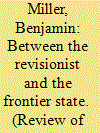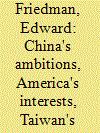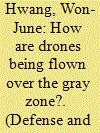| Srl | Item |
| 1 |
ID:
087932


|
|
|
|
|
| Publication |
2009.
|
| Summary/Abstract |
This article explains variations in state war-propensity. I introduce a new typology of state war-proneness based on four major types of states: revisionist, failed, frontier, and status quo. The major novel contribution of this essay is the argument that the combined effect of variations in the extent of success in state-building (strong or weak states) and nation-building (nationally congruent or incongruent) shapes the level and the type of state violence by producing different categories of states with regard to their war-propensity. Strong states but nationally incongruent generate revisionist states, which initiate aggressive wars. The combination of state strength and national congruence leads to a status quo state. Weakness and incongruence bring about civil wars and foreign intervention in 'failed' states. Weakness but congruence produce the 'frontier state' with boundary and territorial wars, but also with a reasonable likelihood of evolution of status quo orientation over time. I focus here on key examples of these types of states, especially from two regions: Iraq and Lebanon in a highly war-prone region - the post-World War II Middle East; and Argentina and Brazil in a more peaceful one, at least in the 20th century - South America, although these states experienced quite a number of wars in the 19th century.
|
|
|
|
|
|
|
|
|
|
|
|
|
|
|
|
| 2 |
ID:
120397


|
|
|
|
|
| Publication |
2013.
|
| Summary/Abstract |
For international relations realists, the rise of a world power changes the global distribution of power. By so doing, it redefines national interests and compels governments to rethink old policies that suddenly do not make sense. Given the rise of China, it is not surprising that some American analysts suggest a change in U.S. policy toward Taiwan ending U.S. arms sales. This article weighs the arguments for and against that policy change in the context of China's awesome rise and of American interests in the Asia-Pacific region.
|
|
|
|
|
|
|
|
|
|
|
|
|
|
|
|
| 3 |
ID:
181219


|
|
|
|
|
| Summary/Abstract |
Drones have been affecting many areas since their advent, including conflicts between states. Used as a coercive measure, how they are flown by measured or limited revisionists can be understood in terms of the gray zone strategy. The concept of the gray zone is somewhere between peace and war, and the gray zone strategy enables revisionists to gradually alter the status quo without triggering war or overt conflict. Both theoretically and empirically, drones could be a useful tool in gray zone conflicts. This paper attempts to specify and organise such operations according to the question: “How are drones being flown over the gray zone?” Revisionist states fly drones based on the salami tactic, or feigned innocence, or by putting them in the hands of proxy forces to expand gradually their interests and destabilise troubled regions; therefore, understanding drone strategy and considering counter-measures are indispensable for securing stability in such regions.
|
|
|
|
|
|
|
|
|
|
|
|
|
|
|
|